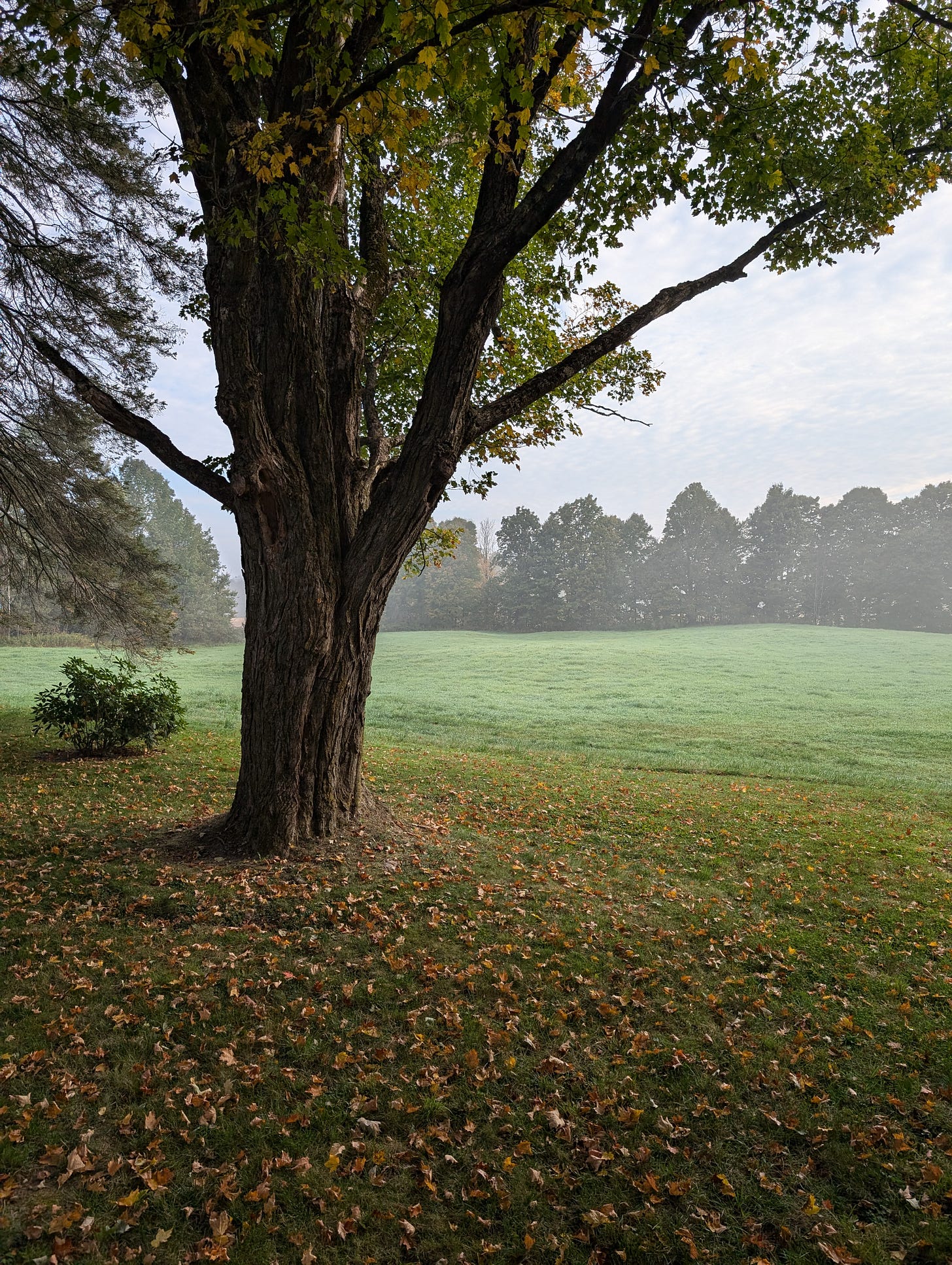Drawing Nearer
"What were you arguing about on the way?"
They were silent, for on the way they had argued with one another who was the greatest.
He sat down, called the twelve, and said to them, "Whoever wants to be first must be last of all and servant of all."
Then he took a little child and put it among them, and taking it in his arms he said to them, "Whoever welcomes one such child in my name welcomes me, and whoever welcomes me welcomes not me but the one who sent me."
Mark 9:33-37
Draw near to God, and he will draw near to you.
James 4:8
I’ll be focusing on our gospel reading today, but this little line in James (who has so many great lines his letter is called the “Proverbs of the New Testament”) jumped out to me: “Draw near to God, and he will draw near to you.” While there is the risk of forcing a connection that isn’t there between two lectionary readings, I do think this line bears on today’s gospel lesson, too.
When we hear about the disciples arguing about who is the greatest, we probably often jump to the obvious pride and puffery in that, the machismo of a bunch of guys trying to be high on the hierarchy. And that’s there. But we only see that endpoint. Maybe we don’t think about the origin of the fight, the good-intentioned yearning that underneath the bravado, they just really wanted to be close to Jesus. They were trying to draw near to God. He was the great Messiah-to-be, how else to be close to him than being the ultimate follower?
So Jesus teaches a lesson that is so important he practically repeats it verbatim in Mark’s economic gospel just a chapter later in Mark 10:35-45, with a slight twist. Presumably, James and John had heard him say this, yet they go right back to wanting to be the greatest and sit on Jesus’ left and right hand of his power, as “drawn near” as you can get. What does Jesus say? Almost exactly what he says here:
Instead, whoever wants to become great among you must be your servant, and whoever wants to be first must be slave of all. For even the Son of Man did not come to be served, but to serve, and to give his life as a ransom for many.
Mark 10:43-45
We’ll return to that Son of Man line later. For now, let’s think more about what Jesus is saying about how to “draw near.”
The Difference Between Right and Almost Right
Whether they believe in God or use his name or not, I think there are as many ways that people try to draw close to God as there are leaves on the ground this equinox. I think those of us who do believe in God can be charitable in seeing much of secular culture for the yearning for God that it is, indeed seeing that wherever there is truth, goodness, and charity, there is God. As for us who claim Christ, we have our own ways to draw near (one is what we did this morning in worship). Other ways we know as well-prescribed from Christ; Jesus draws near to God in prayer, in retreating into solitude, in nature, in his close friendships, and more. He doesn’t do it for his own sake, as his whole existence and ministry is for sacrificial, other-serving love.
This is not to say Christians are the only ones perfectly drawing near to God. Even for us, this concept can be subtly seductive. We might pray to God to draw near, but we ask for wrong, selfish things in prayer. Or we might want to feel close to God in our friendships…in order to avoid our enemies. One of my personal proclivities is doing my best impression of a mystic in the woods to avoid all the insanity of the world.
Of course, there is nothing evil in prayer, friendship, or retreating into nature. But I saw an old Charles Spurgeon quote floating around this week, who wrote, “Discernment is not the ability to tell the difference between right and wrong; rather, it is telling the difference between right and almost right.” So many of our ways and the world’s ways are almost right.
And when our faith is strained, or flickering, or not there at all, our ways of drawing near to God can still be almost right. When I did not believe in God through much of my twenties, I still tried to draw nearer to him. Perhaps it is because I did not have faith that I really wanted to do anything to draw near to ethereal properties of Divinity, Transcendence, Transformation, Vitality. So first, I tried to dedicate my life to the pursuit of being a philosophical, confessional, weirdly-spiritual standup comic, then later podcaster. I didn’t believe in God, but Authenticity was my god, and I honestly did believe by serving it that others might get some help along the way in their own search for self-expression and autonomy. Maybe some did (I think some old podcast fans still read this). As for me, I didn’t see how often this became serving myself. Then as I was building a career, there was something of wanting to draw near to God through being around Excellence, surrounded by high-performing people, being around the best, for if God didn’t exist, whatever-you-want-to-call-God was in the virtues of humanity, surely. Most directly, as many of you know, this eventually became wanting to draw near to God through drugs, particularly psychedelic ones (though I had other favorites). It was here in the raw, personal experience of consciousness where I felt with profound certainty that oh, now this is near to God. I know this is where some readers are.
In writing about this kind of thing in the 1960s, the Catholic monk Thomas Merton said it was perfectly natural and understandable that people who don’t believe in God would use drugs to draw near to what they understand as God:
Since (in this [materialist] view) even the highest and most “spiritual” experience of the human mind is in the end merely matter realizing itself in man’s consciousness, there is logically no reason why material aids (drugs) should not be used to make this realization more rapid and more effective. It is quite understandable that unbelievers should accept this view.1
Further, Merton sympathizes that this is because “modern man, in all his desperation, refuses to be content with religious mediocrity and gropes blindly for the Absolute.” In other words, if you think religion is all about an inner search for knowledge and authenticity and is purely a psychological or cultural phenomenon that is not in dialogue with God but simply an outer manifestation of inner unconscious processes, then your spiritual practices can be purely psychological phenomena. Manipulating your mind to elicit divine feelings and profundity makes sense; it is “almost right.” But if we believe in God, I do believe this misses the mark. As Merton concluded, “It is disturbing to see Christians and Jews accepting it uncritically and, one might add, very naively, without apparently reflecting on the momentous theological implications of their act in regard to faith, grace, the love of God, and the awareness of our fallen situation.”2
Drawing Near, or Being Like?
One of the problems with wanting to “draw near” to God is that “I want to be closer to God” can quickly become “I want to be like God,” like the serpent in the Garden promised. Maybe we want to draw near God’s all-knowing nature by knowing more, or his all-powerful nature by becoming more powerful, his pure goodness through wringing ourselves like a rag until we are ultra-pure. In the case of drugs, it is often a form of “magic” in the old sense of it: rituals and substances to manipulate spiritual powers. We do this because we want to draw near to God, but this quickly becomes wanting to be like God by manipulating the spiritual world, wanting to control spiritual power that does not belong to us, but belongs to him.
In traditional Christianity, “magical” theology often is trying to manipulate God by saying our actions dictate his, that by doing the right, perfect-orthodox incantations we have bound him, by eliciting certain feelings we have thus beckoned his Spirit to our bidding (and its converse, if someone didn’t do the right things for the right reasons, then God surely couldn’t have been present). This applies to anything we do where our subconscious process is, “If I do this, then God will come to me.” This is the error of all works-righteousness.
Turning back to our disciples and their greatness argument, I think it’s interesting Scripture doesn’t say what the basis of their argument was. They were arguing who was the greatest...how so? Was it, “I’m the smartest,” “I’ve converted the most people,” “I’ve given the most money to our Jesus movement,” “I’ve been the most compassionate,” “I’ve been the most dedicated follower,” “I never missed one of Jesus’ sermons—James, I didn’t see you there last week, just saying!”, “My politics are closest to Jesus”...what could be the criteria they were arguing for what made them the greatest? What would vault them to the top right next to Jesus?
Yes, there was pride, but it’s still also a kind of magic—we want to manipulate God through manipulating ourselves into greatness which he must then accept, trying to force God to accept our spiritual credentialism. Instead what Jesus challenges us to do, as his brother James also challenges later, is submit to God. How? By serving others. Not just serving others, but serving the least, the last, the lowliest, the loneliest.
The Son of Man Standing On His Head
The gospel lesson today is something most of us have heard a million times from Jesus, but maybe it helps to hear the reminder for the sake of our human amnesia. It becomes clearer upon remembering that Jesus Christ came to serve us, and that God moved first to draw near to us through Jesus Christ.
In our story today, Jesus holds up a child—and children were not revered like in our culture today, but often treated as low-status burdens3—to show even more clearly that while he might be the Son of Man in all his power and glory, we have fundamentally misunderstood him. To welcome him and to welcome God is to welcome and serve and seek out the places and people society hides, to seek out God where and among whom we least expect it (and maybe least desire). As James says earlier in his letter, “pure religion” is to “look after orphans and widows in their distress and to keep oneself from being polluted by the world.” (James 1:26-27) And if you don’t want to be polluted by the world? Serve it!
Now, as for that Son of Man bit:
He was teaching his disciples, saying to them, "The Son of Man is to be betrayed into human hands, and they will kill him, and three days after being killed, he will rise again." But they did not understand what he was saying and were afraid to ask him.
Mark 9:31
Last week and again this week and all throughout the Gospels, Jesus refers to himself as the “Son of Man.”4 This has puzzled many of us. It comes from the Book of Daniel, and it means something like “a certain human.” Almost like “the Guy.” But, you know, “Son of Man” has a little more weight than saying, “The Guy will come, riding on the clouds…”
In Daniel, the Son of Man comes to preside in the heavens above the land of wilder and wilder beasts that have come to dominate humanity. So the meaning behind “Son of Man” isn’t just talking about Jesus’ humanity, but also how this person will come to rule over the beasts that have reigned ever since we let them rule over us in the Garden. It was first a beast that said we could draw near to God by being more like God, and we have repeatedly acted this way ever since. And the beasts multiplied, and the world of humans became ruled by a beastly nature ruling within us, with the powers and principalities even using humans ourselves to oppress and destroy other humans.
In the words of the Bible Project (which is a great resource for many things):
Jesus is the first human to overcome the beast, and as a result, he can partner with God to rule the world. And so now, Jesus is summoning a new humanity into existence, one that can overcome the beast in the same paradoxical way: to rule the beast by dying. And then by discovering that Jesus’ life and power can become our life and power, so we can rule the world as God’s partners, but Jesus-style—in the power of service, humility, and self-giving love.
The disciples had heard Jesus say he was the Son of Man, and so they wanted to be great and rule with him, but they were confused. Because now the powerful Son of Man was practically standing on his head; the Guy they expected to come in all this triumphant glory was saying this glory is in a mustard seed, that this glory is in smallness, littleness, in sacrifice, and to rule the beast is not to become more like God, but to humble ourselves by emptying ourselves of ourselves so that God can work more and more.
Over and over again, we want to exalt ourselves. We want God to be in the high places because we want to be in those high places. We want God to be in lavishness, pomp, and circumstance. We want God to be in the most impressive, efficient, effective places, like the guru who says, “God is One and all are one, so I might as well be a wealthy one.” In those places, we only draw nearer to ourselves.
The Greek word for humility that James uses is tapeinos. It is to be ranked lower, and indeed, children like the one Jesus held up were among the lowest ranks in their society. In a mystical Christian sense, tapeinos is also described as an inner lowliness, a person who depends on God instead of themselves. To draw near to Him is to draw away from the parts of ourselves that are not really us, for they are not in his image, to depend more and more on God. And we can know we are depending and trusting him when we are truly serving people beyond ourselves.
A Bit of Risky Bragging
With no small risk, before I end this I want to brag a bit about the church I serve here in Craftsbury. It is not my doing; I am so grateful for the work they have done and were doing long before I got here. I am so grateful that on the same week we read Jesus telling us to welcome the child in his name, a local childcare non-profit is having an open house to share with the community their expansion plans onto the church’s extra property, a project much-needed for our rural area that is many years in the making, finally getting closer to reality. This is just the latest example. I am so grateful for all the times in our community when some of our members have stepped up to help others who really needed it, in so many ways, big and financial and little and interpersonal, short-term emergencies and long-term discerning plans. I am just so grateful. I learn from and am inspired by their example constantly. And I know there are lots of churches in smaller and smaller congregations who are still doing the same with less and less resources.
To my church, and to other churches who may be similar, I just want to encourage us to keep going. Keep it up. We may be small and smaller than we were, but God is in the small. God is hidden in plain sight—even to us. So many in the rest of our community outside the church are wonderful in their service, too, and we certainly hope in time more might join us in hearing Christ’s invitation to serve, and in the meantime we hope they will let us know where we can be invited to serve more.
One part of the good news is that even though we try all these almost-right ways to draw near to God, we don’t have to achieve anything or become anything to draw near to God. Through a living faith in the living Christ, we know that the good news is we are at our most free in Christ when we help others. The good news is God has already drawn near, and he is as near as our hearts and our soul. In fact, Jesus is even closer in the hearts of our neighbor. So whoever and wherever you are, let us continue drawing nearer by continuing to go out, serving and welcoming all in his name.
Merton, “‘Spiritualité’ Psychédélienne,” in Collectanea Cisterciensia, Accessed from Thomas Merton Center at Bellarmine University. https://web.archive.org/web/20220816232211/https://merton.org/Research/Manuscripts/manu.aspx?id=3825/.
There is much more on Merton’s psychedelic thought that I will share in due time.
Thanks as always to the Burts of At Home with the Lectionary for their weekly podcast conversation-starters for preachers and laypeople.
Thanks to the Bible Project’s eight-part podcast series on the Son of Man for informing this section.








